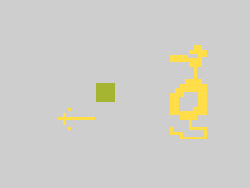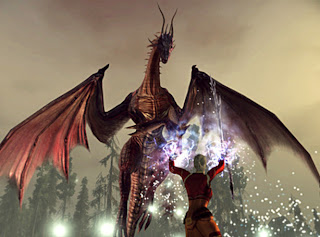by Anand Ramachandran
For an industry which is less than forty years old, a decade represents a very large and significant slice of history. The last ten years have been arguably the most exciting decade for videogames since the heady days of the eighties – with great leaps forward in every conceivable sphere. For those of us who are old enough to remember the early ATARI 2600 days when we though 'Enduro' was hyper-realistic and 'Raiders of The Lost Ark' featured a huge gameworld, there's an inescapable sense of wonder when we look at games like Forza Motorsport 3, Oblivion or Grand Theft Auto IV. At least, there should be.
Battling dragons in videogames has come a long way indeed.
This was the decade of the superconsoles – a period when the XBOX, PS3 and Wii became household names worldwide. Microsoft boldly entered the console gaming world, and shook up things so badly that a complacent Sony and a sleeping Nintendo were forced to bring their A-games back into the arena. The result? We, the gamers, have three great console platforms to play on, and thousands of great games to play. And videogame consoles have truly broken through into mainstream consciousness – as Christmas presents, as entertainment systems, and as cultural references. It's a rare point in gaming history that none of the three major players are going through a weak period. Consoles are promising to do new and wondrous things – motion gaming, face recognition, immersive 3-D – and if the last ten years are anything to go by, we're in for a wild ride.
Of course, this was a decade when the industry realized that there were millions of people who would play games, if only game makers would bother making gamnes that appealed to them. Will Wright, that mad genius, created a most unlikely game about ordinary people doing ordinary things (baking cakes, mowing the lawn, taking dumps), which promptly went on to become the best selling PC game franchise of all time. Nintendo, with the wonderful Wii and DS, brought millions of people into gaming's fold. Zynga, with their blockbuster facebook games Farmville and Mafia Wars, showed how relatively hardcore game mechanics could appeal to casual gamers. Apple showed the way for mobile games, demonstrating that their iconic iPhone was really a great device to play games on, with resounding success.
It was a decade where people played unexpected games, in unexpected ways.
The Wii, propelled by the 'Wow' factor of how their motion controller worked with the Wii sports title had people all over the world whooping with delight as they played virtual golf, tennis, bowling and boxing, gleefully swinging their Wiimotes in frantic joy. 10 million consoles sold, and the Wii shows no signs of slowing down. Rivals Microsoft (with the much anticipated Project Natal) and Sony were forced to respond, and will introduce their own motion controllers soon enough – only time will tell if they will find the same widespread appeal.
The Music genre was also responsible for taking gaming in a refreshing new direction, and to completely new audiences. What started off with Guitar Hero, the air-guitarists dream come true, has evolved into a genre that offers gamers the chance to play together as full-fledged rock bands – with guitar, bass, drums and vocals. And, in one of gaming's greatest coups, the Beatles : Rock Band featured the first time that the music of the greatest band of all time was available in a digital format. Now, everyone could vicariously experience the journey of the Fab Four, from Liverpool to world fame. The game sold millions of copies, and completely changed the landscape of the genre. For non-rock fans, DJ Hero soon followed, and 'air-DJs' could now spin their own mixes at the world's top nightclubs to their hearts' content.
The resurgence of casual gaming did not mean the end of hardcore games – in fact, it was quite the opposite. Hardcore games grew in popularity and influence – many casual games benefited from adopting design ideas from their more hardcore counterparts. The decade saw games reach a new level of achievement altogether – games like Baldur's gate 2, Metal Gear Solid 4, Super mario Galay, Half life 2, Uncharted 2 and Bioshock settling the 'are games art?' debate once and for all. With narrative making a strong comeback, games continue to grow as a fantastic storytelling medium, and the smart money is one games equalling or even surpassing cinema in terms of delivering immersive narrative experiences, in the next ten years. Case in point – James Cameron's sensational Avatar used a game-engine-like system which allowed Cameron to control the camera and direct the scenes as he pleased. Imagine that control in the hands of the end-user – enabling you to experience and explore the world of Avatar however you liked. The mind boggles.
As with many other things, gaming too went social thanks to the Internet. Games like Counter-Strike, Unreal Tournament, Halo and Call of Duty 4 took online multiplayer to whole new levels, with millions of players forming worldwide communities. World of Warcraft broke open the floodgates originally breached by Everquest, and changed the map for what is known today as 'massively multiplayer' gaming – where thousands of people from all over the world populate the virtual gameworld as elven wizards, dwarven warriors or human knights, interacting and adventuring together. With over 11 million active players (that's more than the population of Sweden, for instance), World of Warcaft is a phenomenon that has redefined gaming, and indeed, online social interactions. People meet on World of Warcraft, make friends, and even get married. And then they divorce, fighting over issues that are purely in the game. It's quite sensational, and rather scarily powerful. Online multiplayer has become the primary gameplay mode for shooters and sports games – still among the most profitable of genres – ensuring that players stay interested long after the single player experience has ended. Indeed, playing with and against other humans is infinitely more interesting than computer AI opponents, and is definitely the future of gaming.
The PC platform, like Mark Twain, gleefully announced that reports of its death were greatly exaggerated. Firmly establishing itself as the platform of choice for the truly hardcore and gaming's elite, modern PCs sped away like Usain Bolt with a tail-wind behind him, delivering graphics performance that made console gamers weep with envy. PC hardware continues to drive the hardware and software cutting-edge, and is taking the audio-visual aspect of gaming surely and steadily towards the holy grail of true realism. Titles like Dragon Age:Origins and Company of Heroes demonstrated why there are some things you can still do best on a PC.
Looking back, gaming has never been in better health. The market is rapidly growing. Innovation is everywhere. Gaming experiences are becoming exponentially better – more engaging, interactive, social and creative. Here's to the Knoughties, then – and let's drink to an even better decade coming up.
Bossfight plays next-gen games on Intel Core i5 .






Why no love for modern warfare in game of the decade polls?
ReplyDeleteAll it did was just revolutionize online gaming.
@ bond - it just missed out on our top 10. Will feature in the top 50.
ReplyDeleteNice nice, very nice roundup :D One sad thing was PC being given the stepson treatment in majority of the cases.
ReplyDeleteOfcourse, there was this thing about whole indie revolution going full throttle and trying truly different and brave thins in games. All happening on PC and In small scale.
Hope more risky and really good games come next decade. Hope Heavy rain gives a nice start for the trend :D
Hey!
ReplyDeleteWhy do you call Rise of Nations as Lame :-)
@kida - Rise of Nations!! We're HUGE fans of Brian Reynolds.
ReplyDeleteBut what to do, we're testosterone-fuelled like that ;)